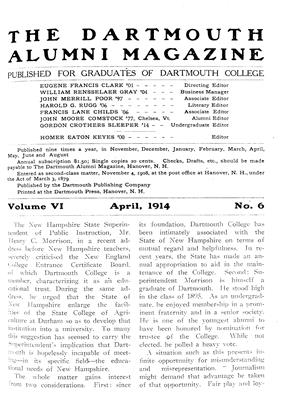Rufus Byam Richardson, former Lawrence Professor of the Greek Language and Literature from 1882 to 1893, died of pneumonia in Clifton Springs, New York, March 10, 1914. From the events of his life, those that follow are chosen to be listed here: — son of Joseph and Lucy M. Byam Richardson, born in Westford, Mass., April 18, 1845; boy-soldier in the Civil War; Yale A.B., 1869; Yale Divinity School 1869-72; Berlin 1872-74; Yale Ph.D., 1878, and B.D., 1883; professor of Greek, University of Indiana, 1880-82; professor of Greek, Dartmouth College, 1882-93; on leave of absence from Dartmouth, Annual Director of The American School of Classical Studies at Athens, 1890-91; Director American School at Athens, 1893-1903; member American Geographical Society, British Society for the Promotion of Hellenic Studies, American, Austrian, German and Greek Archaeological societies, and at the Century Club, New York; editor, in College Series of Greek Authors, of Aeschines's Oration against Ctesiphon (On the Crown), 1889; author of Vacation Days in Greece, 1908; of a History of Greek Sculpture, 1911, and of several technical, archaeological monographs, dealing mainly with excavations at Eretria and at Corinth, most of them in the American Journal of Archaeology before 1905.
Professor Richardson married Alice Linden Bowen on September 6, 1876. He leaves three children, Mrs. Albert M. Lythgoe, Gardner, and Miss Dorothy Richardson.
But what substantial meaning can such a formal recording, even if eventful. convey except to those who chance to know the significance of the events, and who are familiar with the personality and circumstances of the one concerned?
As a Hellenist and Archaeologist, Professor Richardson will be remembered probably more for his ability to vitalize and vivify, to interpret and reconstruct, than for his contributions to constructive scholarship, which were notable in archaeology, particularly in published results of excavations at Eretria and at Corinth. But the felicity with which his own interest recalled to living realities episodes, conditions and events of the long dead past, so that they moved and had a being also to the minds of others with whom he freely shared his impressions, won the" interest and respect of the younger men, whom he dealt with mostly and left upon them the more lasting impression. It was this unanalyzable personal touch that won a considerable willingness to tail hard on Demosthenes's Crown Oration by the first elective group of Dartmouth men that chose to stick to Greek against the allurements of advancing Mathematics. A member of a class just ten years later, Philip Marden '94, has said "I have known many teachers of youth, but never one more genuinely gifted with that essential faculty which awakens in the student the enthusiasm of his instructor. Personally, Professor Richardson was the kindliest and sunniest-natured of men. Intellectually, was exceptionally well endowed. And spiritually, he was an unfailing inspiration My gentle friend, to whom I owe more of my maturer capacities for enjoyment than I can well express, is gone. But he left the world sweeter and better for his presence in it, and many hundred men and women likewise better for his labors in their behalf in his chosen and congenial field. Delighted through familiarity with many of the finest and most glorious Phenomena of out-of-doors, particularly with sweeping prospects from mountain's in the morning, before sunrise, and at evening, delightfully familiar with much of the best that has been thought and done by man in the world, Professor Richardson always naturally could share his enthusiasm with those about him and remarkably often he would kindle in his pupils and other associates enthusiasms not just his perhaps, but like his, unfeignedly their own. This means that he was simple, direct, hearty, easily receiving as well as giving the amenities of good fellowship, genuinely human, but withal true to his own personality, possessed of courage with a will to resist vigorously what seemed to him wrong. Professor Richardson was a lover in the finest sense that Plato-Socrates employed the term, and his is the lover's reward.
 View Full Issue
View Full Issue
More From This Issue
-
 Article
ArticleMEETING OF DARTMOUTH SECRETARIES
April 1914 By W. Gray Knapp '12 -
 Article
ArticleThe New Hampshire State Superintendent of Public Instruction,
April 1914 -
 Article
ArticleIN MEMORY OF PROFESSOR CHARLES F. RICHARDSON
April 1914 -
 Class Notes
Class NotesLOCAL ASSOCIATIONS
April 1914 -
 Article
ArticleNOMINATIONS FOR ALUMNI TRUSTEE
April 1914 -
 Article
ArticleDARTMOUTH THEN AND NOW
April 1914









